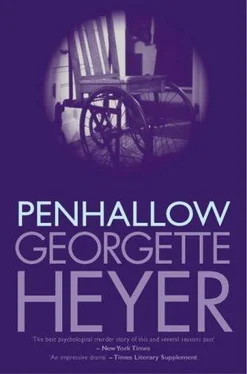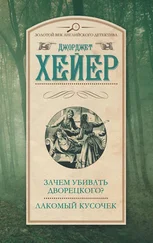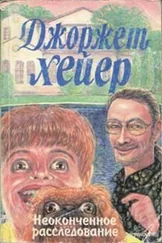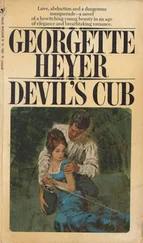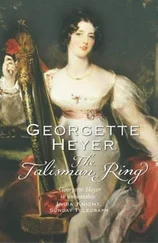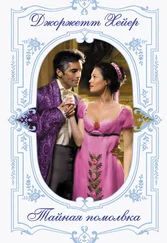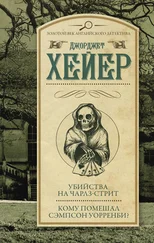Джорджетт Хейер - Penhallow
Здесь есть возможность читать онлайн «Джорджетт Хейер - Penhallow» весь текст электронной книги совершенно бесплатно (целиком полную версию без сокращений). В некоторых случаях можно слушать аудио, скачать через торрент в формате fb2 и присутствует краткое содержание. Год выпуска: 1942, Жанр: Детектив, на английском языке. Описание произведения, (предисловие) а так же отзывы посетителей доступны на портале библиотеки ЛибКат.
- Название:Penhallow
- Автор:
- Жанр:
- Год:1942
- ISBN:нет данных
- Рейтинг книги:3 / 5. Голосов: 1
-
Избранное:Добавить в избранное
- Отзывы:
-
Ваша оценка:
- 60
- 1
- 2
- 3
- 4
- 5
Penhallow: краткое содержание, описание и аннотация
Предлагаем к чтению аннотацию, описание, краткое содержание или предисловие (зависит от того, что написал сам автор книги «Penhallow»). Если вы не нашли необходимую информацию о книге — напишите в комментариях, мы постараемся отыскать её.
Penhallow — читать онлайн бесплатно полную книгу (весь текст) целиком
Ниже представлен текст книги, разбитый по страницам. Система сохранения места последней прочитанной страницы, позволяет с удобством читать онлайн бесплатно книгу «Penhallow», без необходимости каждый раз заново искать на чём Вы остановились. Поставьте закладку, и сможете в любой момент перейти на страницу, на которой закончили чтение.
Интервал:
Закладка:
When he reached the hunting-stables, his face still wore so forbidding an expression that a stable-boy, carrying a couple of buckets across the yard, made all haste to remove himself from his sight; and a groom, who was engaged in strapping a flea-bitten grey, exchanged a significant glance with one of his mates.
Raymond paused for a moment, silently watching the busy groom. Apparently he had no fault to find, for, to the man’s relief, he passed on. The upper halves of the loose-box doors stood open, and a row of beautiful heads looked out. Raymond stopped to caress one of his own hunters; parted the hair on the neck of a bay mare with his fingers; inspected the ears of a neat-headed Irish hunter; entered one of the boxes to examine the hooves of a nervous chestnut under treatment for thrush; and was joined presently by his head-groom, with whom he held a brief discussion of a highly technical nature. He still looked rather forbidding, but his scowl had lightened as it always did when he came amongst his horses. He glanced round the quadrangle, thinking how good were these stables of his own designing, thinking that the new groom he had engaged shaped well, thinking that he would advise Bart to have his grey’s shoes removed, thinking that when Penhallow died — But at this point his thoughts stopped abruptly, and he swung round to visit the harness-room. One of the hands was washing some dirty harness there, which hung on a double-hook suspended from the ceiling; Bart and Conrad, as well as himself, had been exercising horses earlier in the morning, and the three saddles were spread over the long iron saddle-horse. Glass-fronted cupboards running round the walls contained well-polished saddles on their brackets, gleaming bits attached to neatly hung bridles, all in demonstrably good order. A quick look over some horse-clothing, spread out for his inspection, a glance along the shelf stacked with bandages, a nod in answer to a request for more neat’s foot oil and some new leathers, and he passed on to the hay-chamber, and to the granary, with its corn-bruiser, its chaff cutter, and its many bins.
When he left the stables, he strode off to the ramshackle building which housed his runabout, and backed this battered and aged vehicle out into the yard. He decided that he had just time to pay a visit to his studfarm before motoring into Bodmin, and drove off noisily up the rough lane which led to it.
He found Ingram there, talking to Mawgan, the studgroom. The brothers exchanged a curt greeting. Ingram, who was sitting on his shooting-stick, said: “I’ve been saying to Mawgan that we’d do well to get rid of the Flyaway mare.”
Raymond grunted.
“Guv’nor all right?” Ingram asked casually.
“Much as usual.”
“Going to take a look at the Demon colt? I’m on my way to the Upper Paddock myself.”
Raymond had meant to take a look at the colt on which his present ambitions were centred, but he had no wish to do so in Ingram’s presence. He replied: “No, I haven’t time. I’ve got to get to Bodmin.”
“Oh! Did Weens show you that quarter-piece?”
“Yes.”
“Dam’ bad,” remarked Ingram, easing his game leg a little. “If you’re going into Bodmin, you might tell Gwithian’s to send me up another dozen of lager. Save me a journey.”
“All right,” Raymond said. “Nothing wanted here?”
“Not that I know of:’ Ingram eyed him shrewdly. “Bank again?” he inquired laconically.
Raymond nodded, scowling. “Going the pace a bit, isn’t he?”
“If you think you can clap a curb on him, try!” recommended Raymond savagely. “I’m fed up with it!”
Ingram laughed. “No bloody fear! Leave him alone: he’ll quieten down if you don’t fret him. You never had an ounce of tact, that’s your trouble.”
Raymond got into his car, and started the engine.
“He’s having Clay home,” he said grimly.
“Hell!” ejaculated Ingram.
“And Aubrey,” added Raymond, thrusting out his clutch.
“Hell and blast!” said Ingram, at the top of his voice.
“Laugh that one off!” recommended Raymond sardonically, and bucketed away down the lane.
It did not take him long to reach Bodmin, and his business there was soon transacted. It was when he was coming out of the bank that he encountered his Aunt Delia, fluttering scarves, veils, and ribbons, and carrying a laden shopping-basket in one hand, and a capacious leather bag in the other.
Those who had known Delia Ottery since her childhood said that she had been a very pretty girl, although cast a little into the shade by her sister Rachel. Her nephews, not having known her as a girl, were obliged to take this opinion on trust. They could none of them remember her as anything but an untidy, faded old maid, whose lustreless hair was prematurely grey, and always falling down in unsightly tails and wisps. Girlish slimness had early changed to middle-aged scragginess, and as she had never outgrown a youthful predilection for bright colours, frills, and fluffiness, this was considerably accentuated by the clothes she wore. When she accosted her nephew, becoming quite pink in the face from pleasure at seeing him, she was wearing a straw picture-hat on the back of her head, its brim weighed down by a large, salmon-coloured rose. A veil floated from this structure, getting entangled, in the breeze which was blowing down the street, with the ends of a fringed scarf which she wore loosely knotted round her neck. A frock of a peculiarly aggressive shade of blue was imperfectly concealed by a long brown coat; and since the month was May, and the weather not as summery as the picture-hat would have seemed to imply, she wore in addition a feather-boa of a style fashionable in the opening years of the century. She was of a very nervous and retiring disposition, and appeared to be almost as much frightened as pleased at walking into her nephew.
She gasped: “Oh, Raymond! Well, this is a surprise!” and dropped her handbag.
Raymond, whose innate neatness was invariably offended by his aunt’s untidy appearance, betrayed no pleasure at the meeting. He responded briefly: “Hallo, Aunt Delia!” and bent to pick up the handbag.
She stood there, blinking at him with her myopic grey eyes, and smiling a little foolishly. “Well, this is a surprise!” she repeated.
As Raymond drove into Bodmin never less frequently than twice a week, and Miss Ottery did her marketing there every morning, there seemed to be very little reason for her to feel any surprise. However, the Penhallows had long since decided that their aunt was a trifle soft in the head, so Raymond merely said: “I came in on business. You and Uncle Phineas both well?”
“Oh, yes, indeed, very well, thank you! And are you quite well, dear?”
He replied with a slight smile: “Thanks, I’m always well.”
“That’s right!” she said. “And dear little Faith? It seems such ages since I saw her. I don’t know how it is, but one never has time to turn round these days!”
“She’s much the same as usual,” he answered.
They stood looking at one another, Miss Ottery tremulously smiling, Raymond wondering how to get away from her.
“It’s so nice to see you, dear, and looking so well, too!” produced Delia, after a slight pause. “I was only saying to Phineas the other day — actually, it was Tuesday, because I saw Myra in the town, which made me think, not but what I know you young people have your own affairs to attend to, especially you, Raymond dear, I’m sure — well, I was saying to Phineas that we haven’t seen anything of you for ages. And now here you are!”
“Yes,” agreed Raymond. He could see no way, short of walking off, of escaping from her, and added: “Can I give you a lift home?”
She turned pinker than ever with pleasure, and stammered: “Well, that is kind of you, dear! Of course you have your car here, haven’t you? I was just going into the corn-chandler’s to buy some seed for my birdies, and then I thought I would catch the bus, but if you wouldn’t mind waiting for me, I’m sure it would be most kind of you. Though I oughtn’t to be keeping you, I know, for I’m sure you’re very busy.”
Читать дальшеИнтервал:
Закладка:
Похожие книги на «Penhallow»
Представляем Вашему вниманию похожие книги на «Penhallow» списком для выбора. Мы отобрали схожую по названию и смыслу литературу в надежде предоставить читателям больше вариантов отыскать новые, интересные, ещё непрочитанные произведения.
Обсуждение, отзывы о книге «Penhallow» и просто собственные мнения читателей. Оставьте ваши комментарии, напишите, что Вы думаете о произведении, его смысле или главных героях. Укажите что конкретно понравилось, а что нет, и почему Вы так считаете.
